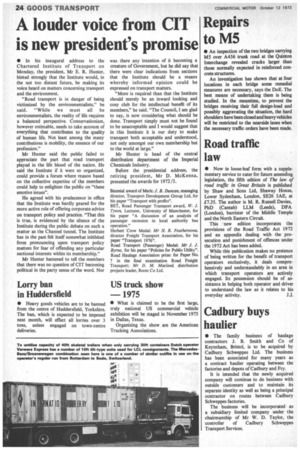A louder voice from CIT is new president's promise
Page 26

If you've noticed an error in this article please click here to report it so we can fix it.
• In his inaugural address to the Chartered Institute of Transport on Monday, the president, Mr E. R. Hunter, hinted strongly that the Institute would, in the not too distant future, be making its voice heard on matters concerning transport and the environment.
"Road transport is in danger of being victimized by the environmentalists," he said. "While we must all be environmentalists, the reality of life requires a balanced perspective. Conservationism, however estimable, needs to take account of everything that contributes to the quality of human life. Not least among the many contributions is mobility, the essence of our profession."
Mr Hunter said the public failed to appreciate the part that road transport played in the life blood of the nation. He said the Institute if it were so organized, could provide a forum where reason based on the collective expertise of the members could help to enlighten the public on "these emotive issues".
He agreed with his predecessor in office that the Institute was hardly geared for the more active role of offering corporate advice on transport policy and practice. "That this is true, is evidenced by the silence of the Institute during the public debate on such a matter as the Channel tunnel. The Institute has in the past felt itself somewhat inhibited from pronouncing upon transport policy matters for fear of offending any particular sectional interests within its membership."
Mr Hunter hastened to tell the members that there was no question of CIT becoming political in the party sense of the word. Nor was there any intention of it becoming a creature of Government, but he did say that there were clear indications from sections that the Institute should be a means whereby informed opinion could be expressed on transport matters.
"More is required than that the Institute should merely be an inward looking and cosy club for the intellectual benefit of its members," he said. "The Council, I am glad to say, is now considering what should be done. Transport simply must not be found to be unacceptable and I would suggest that in this Institute it is our duty to make transport both acceptable and understood, not only amongst our own membership but to the world at large."
Mr Hunter is head of the central distribution department of the Imperial Chemicals Industry.
Before the presidential address, the retiring president, Mr D. McKenna, presented the awards for 1972 /3.
Biennial award of Merit: J. B. Duncan, managing director, Transport Development Group Ltd, for his paper "Transport with profits".
BET, Road Passenger Transport award, W. J. Tyson, Lecturer, University of Manchester, for his paper "A discussion of an analysis of passenger recession in local authority bus operation."
Herbert Crow Medal: Mr H. R. Featherstone, director Freight Transport Association, for his paper "Transport 1976".
Road Transport (Passenger) Medal: Mr J. J. Byrne, for his paper "Policies for Public Utility". Road Haulage Association prize: for Paper No. 7 in the final examination Road Freight Transport; Mr D. M. Macleod, distribution projects leader, Roots Co Ltd.




















































































































